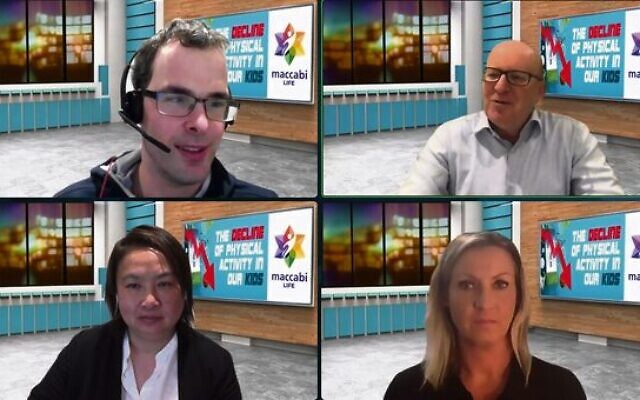Tackling barriers to kids’ participation in sport
Dr Craig Nossel moderated a panel discussion about declining kids' participation in physical activity across Australia, and ways to reverse that trend, in a Maccabi Life Australia webinar last month. The panellists were Dr Natalie Lander from Deakin University's Institute for Physical Activity and Nutrition, five-time Paralympian swimmer Matt Levy, and executive manager of Vic Health's Future Healthy initiative, Sarah Loh. Here are some highlights.

Q. What do the statistics show?
DR NATALIE LANDER
What we’re looking to achieve for children is an accumulation of 60 minutes of physical activity, across the whole day. It can be walking the dog, washing the car, or doing sport or exercise – it’s really just moving your body.
The statistics are quite frightening – we’re now seeing only 2 in 10 children achieving those recommendations, and only 1 in 10 adolescents. And across all ages, [the research shows] girls are less active than boys.
Q. Why are we seeing this decline?
SARAH LOH
There’s various factors. For example, when they start high school other interests start to occur – like having a little bit more of an academic focus, or getting your first job. So, busy lives can get in the way of being active.
Q. Why is physical activity so important for children and teens?
DR NATALIE LANDER
There’s so many reasons. The first that come to mind are physiological benefits, like increasing bone density and muscle strength, and reducing cardio-metabolic and cardiovascular disease risk factors.
I think the most important thing is that we understand the holistic benefits of physical activity, as not just creating elite sportsmen and women, but also young people with positive mental health and perceptions of self, really good social skills, and great opportunities to collaborate and connect with others.
MATT LEVY
I was born with vision impairment and cerebral palsy, and I’ve been to five Paralympic Games, but I started swimming really early on for health reasons.
The mental health aspect of doing sport has also been a big tick in the box. You just feel better, and more energetic and alive, than if you didn’t exercise regularly.
I’ve learned the value of teamwork, of being focused, and about failure, success and all the stuff in between.
It’s about realising there’s a lot to gain from sport.
Q. What advice do you have for parents?
DR NATALIE LANDER
A barrier can be people seeing physical activity as something extra. So if physical activity is integrated within what we already do, it becomes part of our daily lives, and not a chore anymore.
Setting boundaries on screen time, and use of mobile phones, is also important, because if you set clear boundaries with children, although they want to push against it, they also take comfort in it as well, and know it has a benefit.
Modelling, as parents, is critical. You often see parents taking their children to the park, but then they’ll sit on a nearby bench looking at their phone.
We’ve got to be self-reflective, and understand we’re the biggest influence in our children’s lives.
MATT LEVY
When I was an elite swimmer, it was always not so much about winning races, but more about improving what I can do, in and out of the pool, on what I’d done yesterday.
And understanding that things like maintaining a healthy diet aren’t sacrifices, but are just part of the journey.
If you can be a good role model, other people will want to participate and be active too. It’s just a matter of taking the time to value what you do, and can do.
SARAH LOH
It’s going to take the adults to put health at the forefront of our kids’ lives, and we can only do this when you start with better physical and mental health literacy.

comments